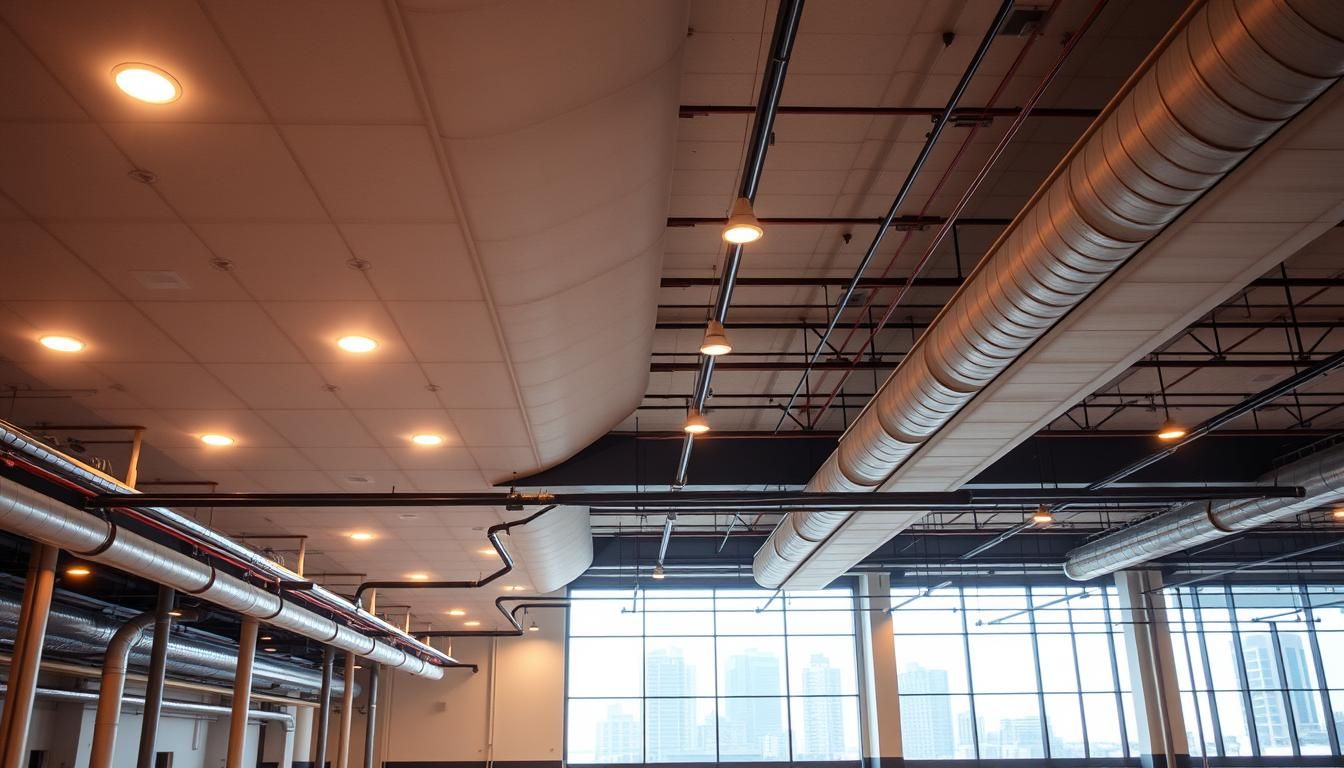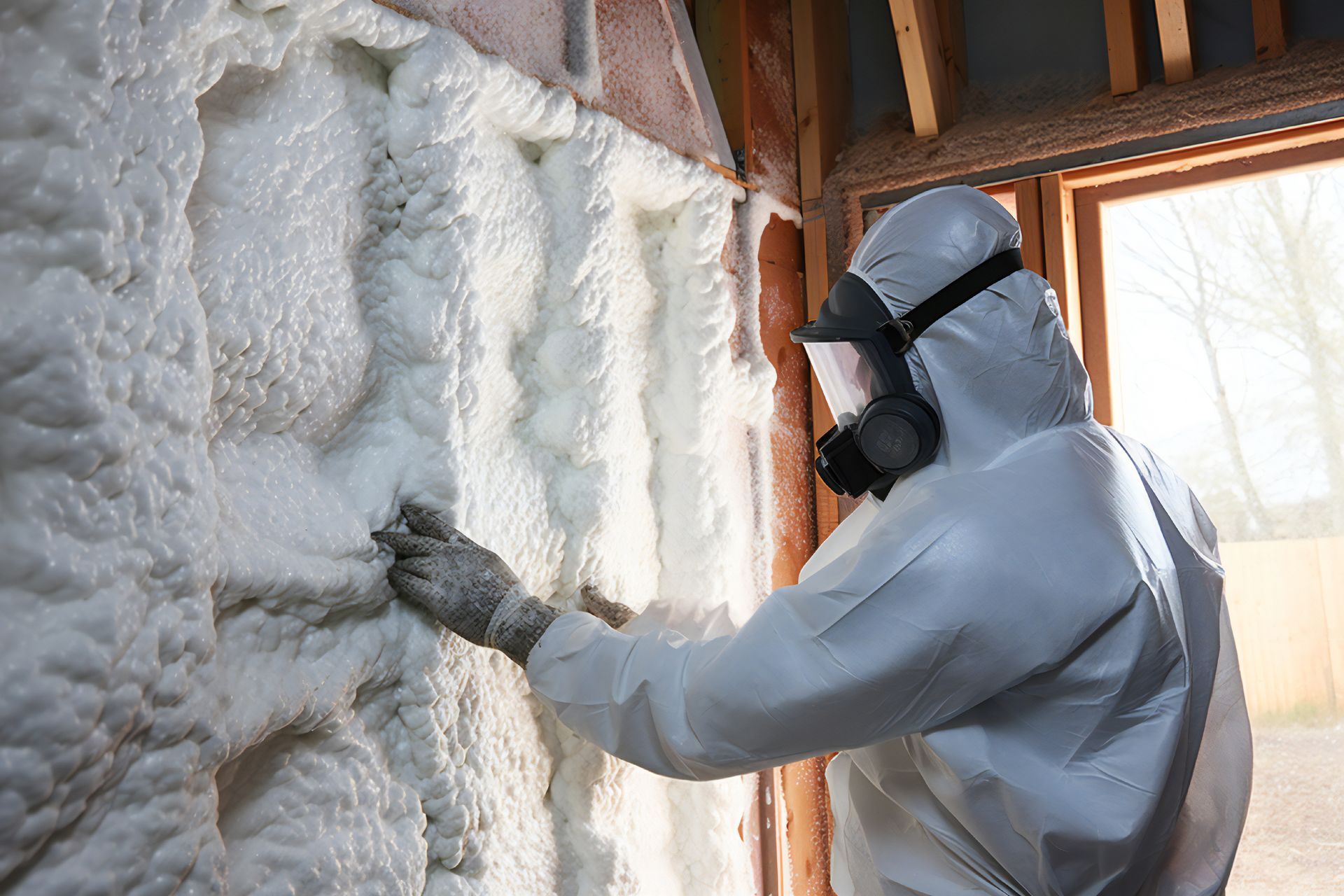How Commercial Spray Foam Insulation is Quietly Revolutionizing Workplace Efficiency and Profitability
Commercial spaces are changing, and spray foam insulation services play a big role. This technology boosts energy efficiency, cuts down on noise, and makes workplaces more comfortable.

By choosing commercial insulation services, companies can save on energy costs. They also get a more productive work area. This happens because insulation seals gaps and keeps the temperature steady inside.
Key Takeaways
- Enhanced energy efficiency through advanced insulation technology.
Reduced noise pollution for a more focused work environment.
- Improved indoor climate consistency.
- Lower energy costs for businesses.
- Increased productivity due to a more comfortable workplace.
Understanding Commercial Spray Foam Insulation Technology
Businesses are looking for ways to cut energy costs and make their spaces more comfortable. Commercial spray foam insulation is a top choice. It's a game-changer for insulating commercial spaces, beating out traditional methods in many ways.
Open-Cell vs. Closed-Cell Foam: Which Works Best for Commercial Spaces?
Choosing between open-cell and closed-cell foam depends on the space's needs and budget. Open-cell foam is lighter and cheaper, great for soundproofing inside. Closed-cell foam is denser and better for outside, where it can handle moisture.
Performance Characteristics and Applications
Open-cell foam is perfect for inside walls and ceilings because it's good at blocking sound and is affordable. Closed-cell foam, being denser and more resistant to moisture, is better for outside walls, roofs, and areas with high humidity.
Cost Considerations for Different Building Types
The cost of spray foam insulation changes based on the foam type, area size, and installation complexity. Closed-cell foam might cost more at first, but its durability and high R-value can save money in the long run.

Modern Advancements in Insulation Materials
The insulation world has made big strides, focusing on better performance, safety, and being kinder to the environment.
Eco-Friendly Formulations
New spray foam insulation uses eco-friendly blowing agents with lower global warming impact. This makes it a greener choice for commercial buildings.
Fire-Resistant and Safety-Enhanced Options
Today's spray foam insulation comes with fire-resistant and safety features. It's treated with fire retardants to meet or exceed local building codes and safety standards.
The Hidden Impact of Professional Spray Foam Insulation Services on Workplace Productivity
Commercial spray foam insulation does more than save energy. It greatly improves workplace productivity. A good insulation system makes the work environment better. It affects employee comfort, noise levels, and air quality.
Temperature Regulation and Employee Comfort
Professional spray foam insulation keeps the temperature steady. This makes sure employees are comfortable. Comfortable employees focus better and work more efficiently.
Noise Reduction Benefits in Open Office Environments
Open offices can be noisy, which hurts productivity. Spray foam insulation cuts down on noise. It makes the work space better for teamwork and focus.
Indoor Air Quality Improvements and Health Benefits
Insulation also improves air quality. It seals leaks and stops moisture, preventing mold. This makes the workplace healthier. It cuts down on sick days and boosts overall health. Look for an "insulation contractor near me" who offers top-notch, energy-saving insulation.
Implementing Commercial Insulation: A Step-by-Step Guide
Getting commercial insulation right takes a few key steps. These steps help make sure your building works well and saves on energy costs. By planning carefully, businesses can get the most out of commercial insulation services.
Step1: Assessment and Planning Phase
The first step is very important for a good insulation project. It starts with a detailed look at the building's current condition.
Building Envelope Evaluation
Checking the building's envelope is the first task. This helps find where heat is lost or gained. Knowing this helps plan the insulation better.
Setting Performance Goals
It's important to set clear goals for the insulation. These goals should match the building's needs, like saving energy and keeping it comfortable.
Step2: Preparation Requirements for Installation
Getting ready for insulation is a big part of the job. This means clearing the area and making sure it's safe.
Space Clearing and Safety Protocols
The area for insulation needs to be free of things in the way. Safety gear and good air flow are also needed to keep everyone safe.
Scheduling and Business Disruption Minimization
Choosing the right time for insulation helps keep business running smoothly. Doing it when it's quiet or off-peak hours is best.
Step3: The Installation Process
Putting in the insulation is a precise job that needs skill. The choice between spray foam insulation services and others depends on the building.
Application Techniques and Quality Control
How the insulation is applied matters a lot. Checks and tests make sure it's done right and meets standards.
Curing and Ventilation Requirements
After it's put in, the insulation needs time to settle. Good air flow is also key to stop moisture and keep it lasting.
Step4: Post-Installation Verification and Maintenance
After it's in, checking how well it works is important. Keeping it up also helps it stay effective over time.
By following these steps and using professional commercial insulation services, businesses can make their buildings more efficient and comfortable.
Calculating the ROI: Energy Savings and Business Benefits
Looking into the ROI of commercial spray foam insulation shows a mix of energy savings, higher property value, and better productivity. To figure out this return on investment, businesses need to look at several things. These include the cost of installation, ongoing energy costs, and any possible incentives.
Short-Term vs. Long-Term Cost Analysis
When checking the cost of commercial spray foam insulation, it's key to split it into short-term and long-term costs. At first, the cost of high-quality foam insulation and professional installation might seem too high. But, the long-term benefits like less energy use and lower bills often make up for the initial cost.
Short-term costs might include the initial costs like materials and labor from an insulation contractor near me. On the other hand, long-term costs look at ongoing energy savings and how it might raise property value with energy-efficient insulation.
Energy Efficiency Metrics and Performance Benchmarks
To really understand the ROI of commercial spray foam insulation, businesses should keep an eye on key energy efficiency metrics. These include energy use before and after installation, and how it compares to industry standards.
By watching these metrics, companies can see how their insulation investment is paying off. This helps them make smart choices for more energy-saving projects.
Tax Incentives and Rebates for Energy-Efficient Commercial Upgrades
Businesses that invest in commercial spray foam insulation might also get tax incentives and rebates. These programs, from government agencies and utility companies, aim to boost the use of energy-efficient insulation.
By looking into and using these incentives, companies can make their insulation projects even more cost-effective. This makes them more appealing financially.
Conclusion: Embracing Insulation as a Strategic Business Investment
Choosing commercial spray foam insulation is a smart move for businesses. It can greatly improve a company's financial health. By working with a professional, companies can make their workplaces more efficient and save on energy costs.
Insulation does more than just save energy. It makes the workplace more comfortable, boosting productivity and employee happiness. Plus, energy-saving upgrades might even get tax breaks, making the investment worthwhile.
As companies focus on being green and saving money, the need for good insulation will only grow. Understanding the benefits of spray foam insulation helps businesses make smart choices. This leads to a more efficient, cost-effective, and eco-friendly operation.
FAQ
What are the benefits of using commercial spray foam insulation services?
Commercial spray foam insulation services offer many benefits. They improve energy efficiency and reduce noise pollution. They also enhance indoor air quality. By choosing high-quality foam insulation, businesses can make their work environment more comfortable. This can also help reduce energy costs.
How do I choose the right professional insulation contractor for my commercial property?
When picking a professional insulation contractor, look at their experience with commercial projects. Check their reputation and if they offer customized solutions. Choose contractors known for quality foam insulation and energy-efficient solutions.
What is the difference between open-cell and closed-cell spray foam insulation?
Open-cell and closed-cell spray foam insulation have different uses. Open-cell foam is cheaper but has a lower R-value. Closed-cell foam is more expensive but offers better R-values and moisture resistance. The choice between them depends on your insulation needs and budget.
How can I minimize business disruption during the insulation installation process?
To reduce disruption, choose a contractor who can install insulation during off-peak hours. Look for those who offer flexible scheduling. This ensures a smooth installation process.
Are there any tax incentives or rebates available for commercial insulation upgrades?
Yes, there are tax incentives and rebates for energy-efficient upgrades, including insulation. Businesses can use these to lower the costs of insulation projects. Talk to a tax professional or insulation expert to find out what's available in your area.
How can I verify the quality of the insulation installation?
To check the quality of insulation installation, look for contractors who follow industry standards. Check for certifications like those from the Spray Polyurethane Foam Alliance (SPFA). Ask about their quality control measures, including inspections and testing.
What kind of maintenance is required for commercial spray foam insulation?
Commercial spray foam insulation needs little maintenance. But, it's important to check it regularly for damage or wear. Regular checks can spot problems early, keeping your insulation efficient and effective.



We Offer All the Services You Need in One Place! We Will Save You Time and Money!
Call Us at (425) 521-7916 Now to Get a Free Estimate or a Free Consultation for Any of Our Services!
